I spent my summer without a computer; here is the story of how that went.
I planned to spend time off the grid this summer – I was going to hike a major section of the Appalachian Trail. I trained for many months during the winter and spring, fine-tuning my gear and building up my body and skills for the task. I injured my knee – then recovered just in time to tackle some larger prep hikes in the White Mountains.
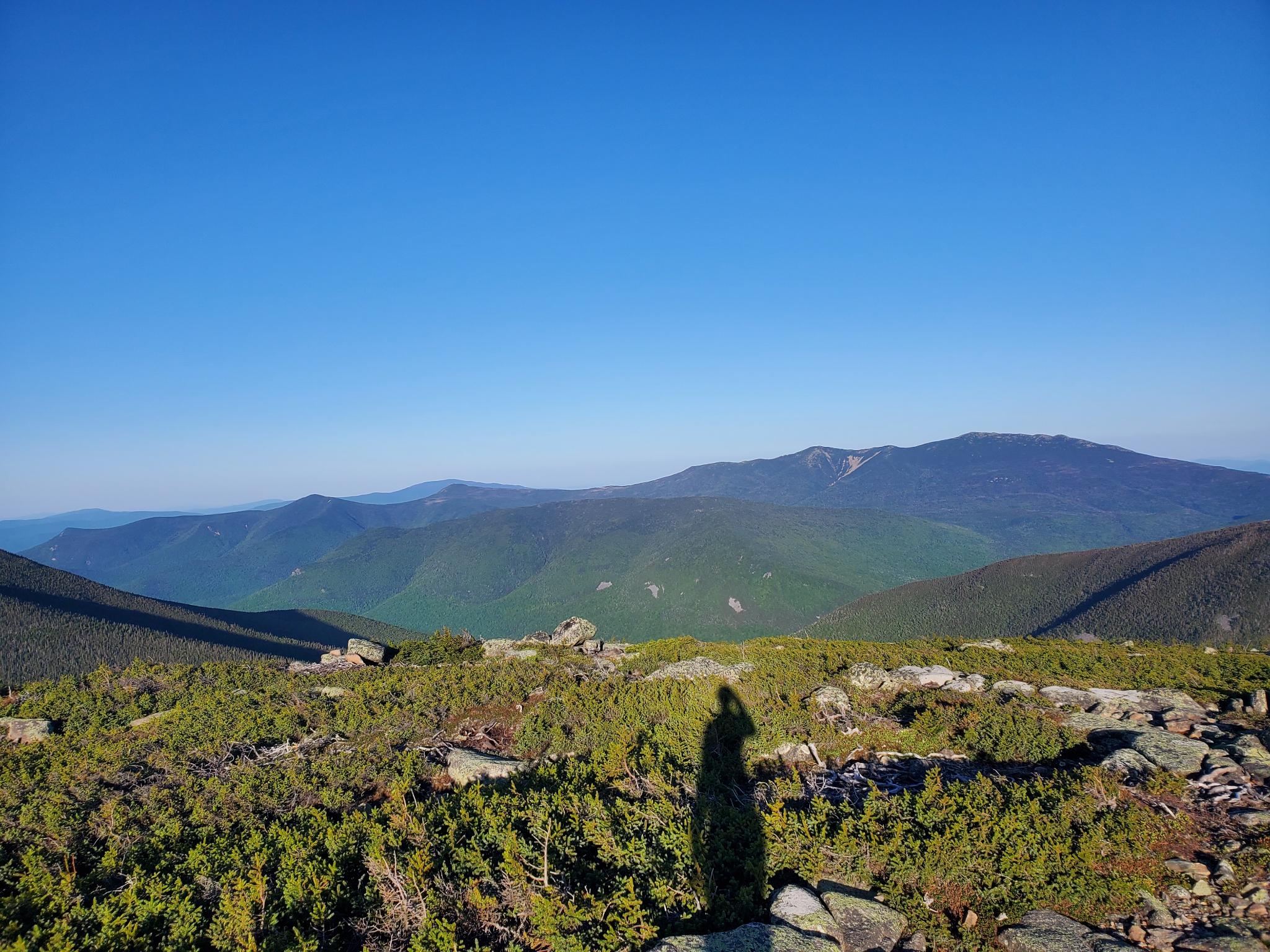
A stunning sunrise on the trail from Guyot to South Twin Mt. in New Hampshire.
But, as I trained more in NH, I recognized quickly that an old foot injury of mine had become irritated – and that 2024 was not going to be the year I tackled any major thru-hiking. After doing some incredible multi-night hikes to simulate the real backpacking experience, I made my decision. Pushing a foot injury with 30 pounds on your back is not a good way to start a longer section hike along the AT. I cancelled my plans to hike south from Katahdin.
Regardless, I felt strong, and had built up muscle and resilience in other areas of my body and mind. It was a totally new experience to set up a tent in the mountains overnight, cook food and tear down to keep moving the next morning. This was a gritty experience, but it was rewarding. It boosted my confidence and self-sufficiency in the woods and provided me valuable perspective about backpacking itself. I had built up resilience to handle the daily grind of backpacking and the mentality that goes along with the sport itself.
Still, I felt disappointed that the big adventure wasn’t going to happen, and found myself sitting in Boston on my computer, unsure what to plan or do. One of the reasons I wanted to go hiking was to avoid sitting around all summer, and especially to avoid the internet for an extended period of time, since it is full of garbage content that wastes my time far too often.
So, when I stopped and thought about what I wanted to do this summer, if it wasn’t going to be hiking, I thought to myself: I just want to get out – and stay out – of my room, and off the internet. How can I make this happen?
Axing the Computer Desk
And it dawned on me, that the simplest way to get off the computer, was to tear down the computer desk itself.
Why not? I had nothing to lose. I took my computer desk apart and moved it, and my office chair, into the basement. I was ready to get out and stay out. Most of all, I was ready to shut off the firehose of the internet; I was ready to just say no to the endless shouting and bickering and politics and clickbait and 24hr news cycle and Reddit and YouTube and everything.
I was ready to enjoy my summer, and not have it be usurped in any way by the endless greedy void of the internet.
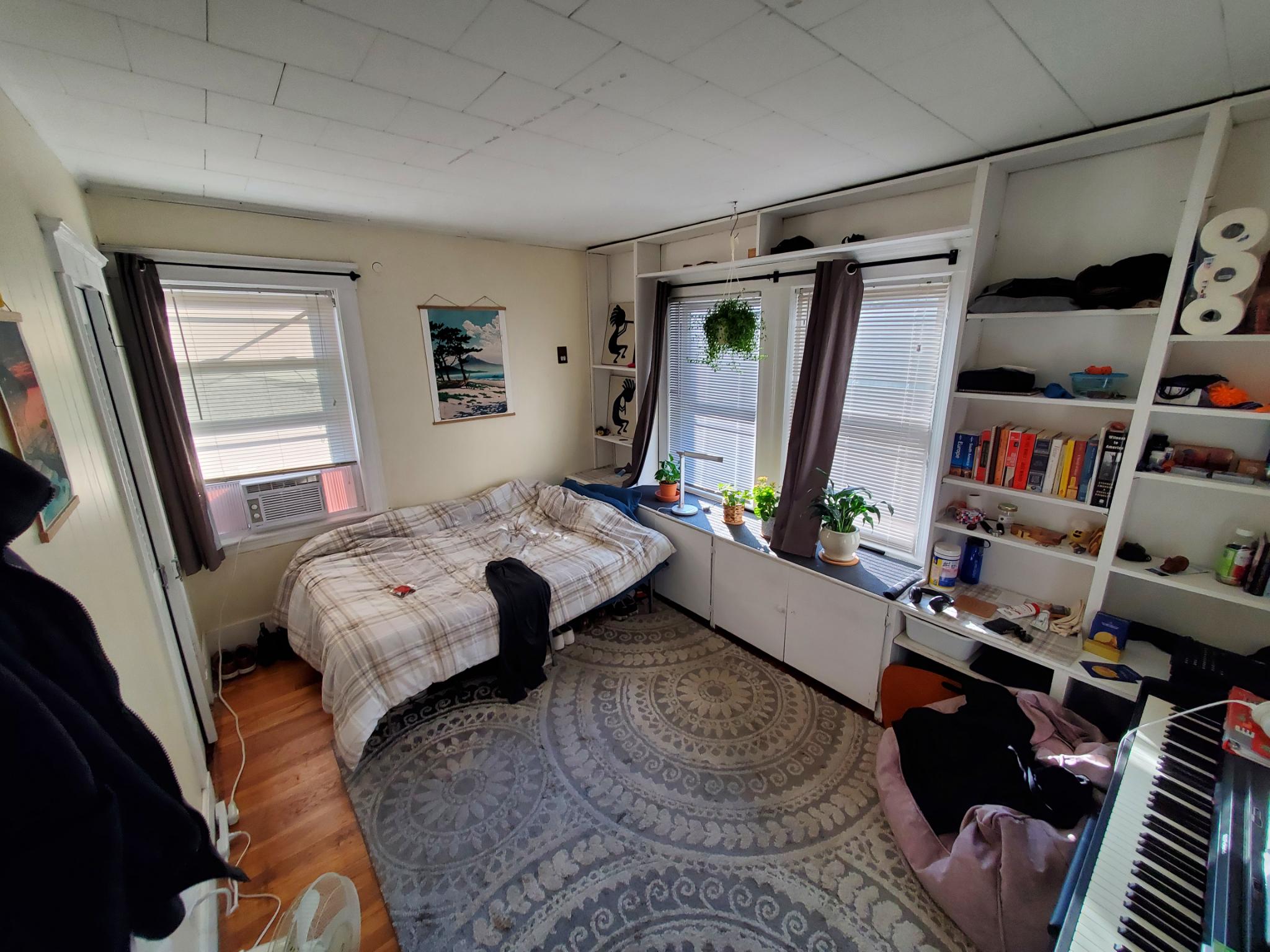
This was the room I was renting this summer. I used to have the piano alongside the left wall here and a computer desk/chair on the right. I took down the desk and lived with a bed, piano and a bean bag for 2 months.
The extra space in my room suddenly made it easier – and very inviting – to do yoga. Added to the extra time I had from not being on the computer, I started stretching and doing more yoga on a regular basis. I got better at yoga, more flexible, stronger, and more confident in trying different movements.
I suddenly had a lot of time in the mornings. I started cooking better breakfasts more often, and made an effort to eat healthier. I cooked a lot of fresh vegetables with meat for lunch/dinner, and had leftovers for days. The summer sun and fresh food gave me loads of energy and ambition.
There was this element of zen in the mornings, which contrasted from the way I used to get up and start my days when I had the computer desk set up. I used to get up, wash up and open the computer to see what was new. Sometimes I would take a peek at the internet as soon as I woke up. But with that gone, I found myself rising out of bed and relaxing for a moment, eating something healthy, and thinking about what I was going to do that day. My headspace wasn’t cluttered with the fog of all the Reddit posts I had read, or what had happened in politics in the last 8hrs since I had last checked the night before. It was a peaceful experience to feel this chaos fade away and disconnect itself from me.
I hadn’t recognized it before, that there was this sort of continuity with which the internet exists. It’s always there; it is the ultimate city which never sleeps. So I would wake up and enter back into the matrix, as if it had never really been shut off and put away for the night. It was still running, and I was just catching up to it the next morning. I wasn’t obsessive about news or what had happened in those 8 hours, but I certainly felt the tug of interest to catch back up to what’s new. This continuity makes it feel like I’ll miss out if I shut off the computer. There’s always something new – the internet never sleeps. This is one of the great addicting elements of it.
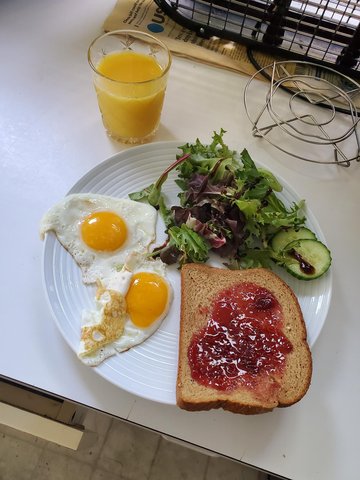
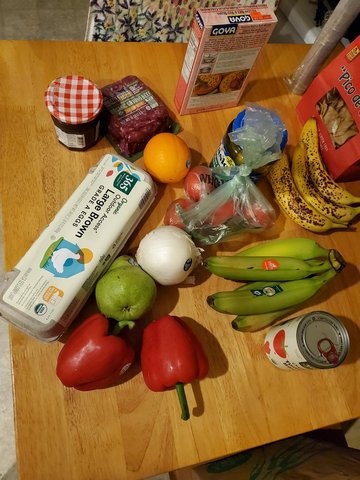
Happy healthy breakfast (with jam!) and lots of natural ingredients to cook with.
The internet stopped following me around. I didn’t eat with it open in the background. I didn’t listen to music with tabs open in another window. I didn’t return to it when I was done cooking. Or when I got home. Or when I dried off from showering. It was gone, poof. It stopped following me around, and I stopped chasing it around.
Time Warp
Time flew by, but there was a lot more of it. A half hour of yoga suddenly was a blip of time. There was nothing else to get “back” to doing. There was no website to refresh or content to “return” to, after doing an activity, so I could spend as long as I wanted doing something without ever thinking that I was missing something. This shift in perspective was the greatest achievement of my desk-axing experiment: axing the fear of missing out.
I recognized that so much of my time was spent on the internet, that my brain had made it a part of me. The websites I visited, the content I read and consumed, the clicks I chose to make, were all part of the vast web of interactions that I performed on a daily basis. With that gone, it felt like the internet was far away. It was no longer a continuous presence in my life or headspace, so I could just nix it as an activity I wasn’t going to engage with, instead of trying to fight against it (while still having the computer on) by trying not to visit social media sites or curating better content for myself. Giving it up was the right move to see things from the other side entirely.
It felt more and more normal to just go out with minimal plans. I went for a run, I sat on the stone at the esplanade for an hour. I walked up to Cambridge on a whim. The mirror pool in downtown Boston invited me to sit next to it, and I chatted with a security guard who made small talk. I found live music to hang out nearby. I bought a muffin and devoured it on the Newbury sidewalk. I sat under a tree in the common with a juice box. I went to art museums. I wandered around and got a bite to eat here and there.
I felt a lot clearer and looser, instead of being stiff sitting on the office chair too much (and the extra yoga helped too). I took the T and walked everywhere – I quit cycling in the city earlier this year, it’s been too dangerous, but I did take a mountain biking trip up into NH. I absolutely careened my body and a metal frame down a hill somewhere in NH that I’ll never return to due to the bugs. I returned to my car with moments to spare before a thunderstorm. It was a good time.
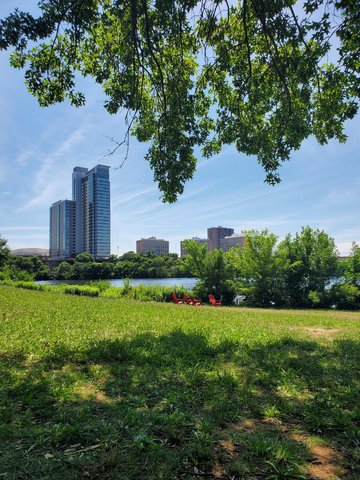
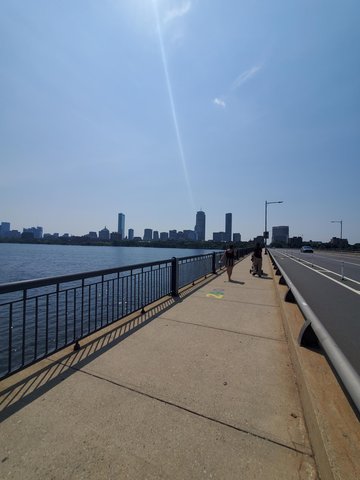
Walking around to explore the city is so much fun because there’s always something going on. Live music here, a street food event there, a cultural festival on the common, it goes on and on, yet there is always a place to relax and watch the world go by.
The Library
Once the initial interest in exploring around town all day wore off, I found myself at the library, almost exclusively. I spent significant time looking through the shelves of the library to pick out what I was interested in. I read many things halfway and moved on – a science book about biodiversity and evolution in ancient lakes “Our Ancient Lakes” – a book about Pangea and what happened before it “The Next Supercontinent” – books on ancient peoples like “The Enigmas of Easter Island”, which I read the majority of – two books about the Incas and their civilization – a book about complexity science – a history book about the Iron Curtain – some Steinbeck – and other adventures into science, history, archeology, fiction, whatever seemed interesting. Most of the political or economic books I lost interest in quickly, but archeology and science seemed to stick.
Other books I finished, cover to cover. Some because I really enjoyed them, others because I had a few chapters left and didn’t want to feel too guilty putting it on my GoodReads.
The computer-free time expansion gave me the opportunity to actively develop my tastes in books and authors – and figure out what was going to stick long-term. I’ve wanted to read more, and this has been a recurring desire for what feels like forever, so I saw the opportunity to test the waters across all sorts of genres. I finished a book about language death in Papua New Guinea (by Don Kulick), and almost finished John Muir’s book on the Sierras. Muir’s description of the woodrats who built stick huts large enough for humans blew my mind. He said there were communities of these 5 foot wide huts that looked literally like Indian outposts from afar.
The Easter Island people and the Inca civilization blew my mind. I never knew that the Easter Islanders competed with each other for who could build better stone heads – and I didn’t know that they originally had eyes that looked out towards the stars. The Inca civilization was impressive in a myriad of ways, but what really stuck out was the absence of money. They built so much, yet simply bartered and traded goods and services with each other, and made it work.
I was in awe with a lot of what I read, whether it was about exploration, ancient peoples, or science. Reading pages and pages of content really got the information whirling around deep in my brain, and I felt like I was learning a lot. Having a library as amazing as BPL helped, of course. Not only did I have a huge selection of books to pick from, but the place was so large that I didn’t feel awkward looking through all the rows to search for new stuff, and then actively taking out and returning books on a daily basis was done via automated kiosks.


This book is “The Next Supercontinent” by Mitchell. It discusses the history of Pangea and how the continents moved before it, forming different hypothetical supercontinents like “Columbia”.
Days Fly By, Thoughts Come and Go
My computer-less summer life became a casual cycle of:
- good breakfasts
- relaxed trips to the library
- exploring books and reading
- hanging out at the esplanade, watching sailboats
- a short trip around my favorite spots in Boston maybe
- hiking
- playing the public piano at BU
- shopping at bookstores
- going home, cooking, eating well
- doing yoga
- sitting in the bean bag
- note-taking
- reflecting on what I’ve read
- messing around on my piano if I felt like it
- maybe reading more if I feel like it
- watering my plants
- cleaning up and sleeping like a baby because I didn’t consume one iota of garbage content that day
My ability to improvise on the piano improved during this time. I had more time to play around with it, and got in more practice than I normally did. I really saw the difference in my abilities as the weeks went on.
I should have made more trips to my parents’ place to do more wood carving, I didn’t even think about it. Or get an RC plane in the air for the first time in a while. I could have done these things too, offline.
My room took on a whole new function for me. It was peaceful and quiet in the physical sense, but also the mental sense from the lack of irritation, ragebait, politics, drama. There was this sharp lack of technology which made everything else pop out as interesting. Over time it became less sharp, and felt normal. My bookshelf suddenly became an active zone instead of a static feature. I spent a lot of time sitting in the bean bag at night relaxing after doing yoga and thinking about a whole lot of nothing – but it was positive nothingness. It wasn’t an emptiness in spite of a mind full of politics, current events, and internet junk, it was a calm emptiness which surely was aware of its disconnection from said chaos, yet didn’t even need to think of it. The nothingness operated in a different space which didn’t include the internet at all in it.
The internet wasn’t a thought – it was gone, it was a wisp of digital energy spinning around in circles elsewhere and getting mad at itself, but it was not inside my head. It was a black hole of waste and bizarre hyperfixation on every little thing, endless obsession with argumentation and political overanalysis. To engage casually with it was to willingly fall into it’s very own trap. To reject its hyperreality seemed natural. To entirely reject viewing it at all, for anything, was sublime. This became more obvious the more time passed. It became useless to me in this sense and I recognized that it always had this quality, I just didn’t know what else to do with myself but find something, anything on there that was worth reading or watching, even for a mere second, to occupy myself. And in my attempts to do so, I found quality content, but to sift through the clickbait and spinning ads on a daily basis had desensitized myself to the experience of having to do this. The simple requirement of the act of filtering content just to find something halfway decent – is just accepted as part of the internet.
I realized I had to ask the question: I can keep trying to filter and find good content on the internet – but at what cost? What is it really worth to me, to stay up to date with so much content that’s largely irrelevant to my life?
Even before the influx of AI-generated spam, the internet has gotten harder to filter for decent content. Google search has changed. Old forum boards have died or even shut down, but even those still running haven’t escaped the haze of politics and the obsession with vomiting current events into every nook and cranny. Any social media is a write-off. It’s tiring to browse the internet; it’s even more exhausting to stay up to date with it, yet hard not to at least try, if the computer is right in front of you…?
Sifting around to find good content exists in some light with books, but it is a much less bizarre experience. Flip to the table of contents to get an idea of the content, and check the qualifications of the author on the book cover.
Along with this, choosing to engage with the book realm was a refreshing experience, because there was so much to read which was completely uncorrupted by the obsessions of the internet realm. There was no comments section, no “reaction” videos, no inline ads spam, no paywalls, no limits, no competition to be on top of every word that’s uttered by every “important” person, no rush to move onto the next thing, no “live feed” to apply pressure for attention, no auto-playing videos, no TikTok soundbites or YouTube “shorts” or Instagram insanity. The firehose of content is meaningless because it just drowns you. The characteristics of the library realm and reading books encompass the exact opposite of the mainstream internet content experience, and I welcomed this heartily into my life.
Not only was the search for something interesting easier, but also the written, physical medium was simple, uncorrupted and focused, and it contrasted so starkly from the internet’s content that it was twice as inviting.
Two months passed, and I didn’t miss the internet much.
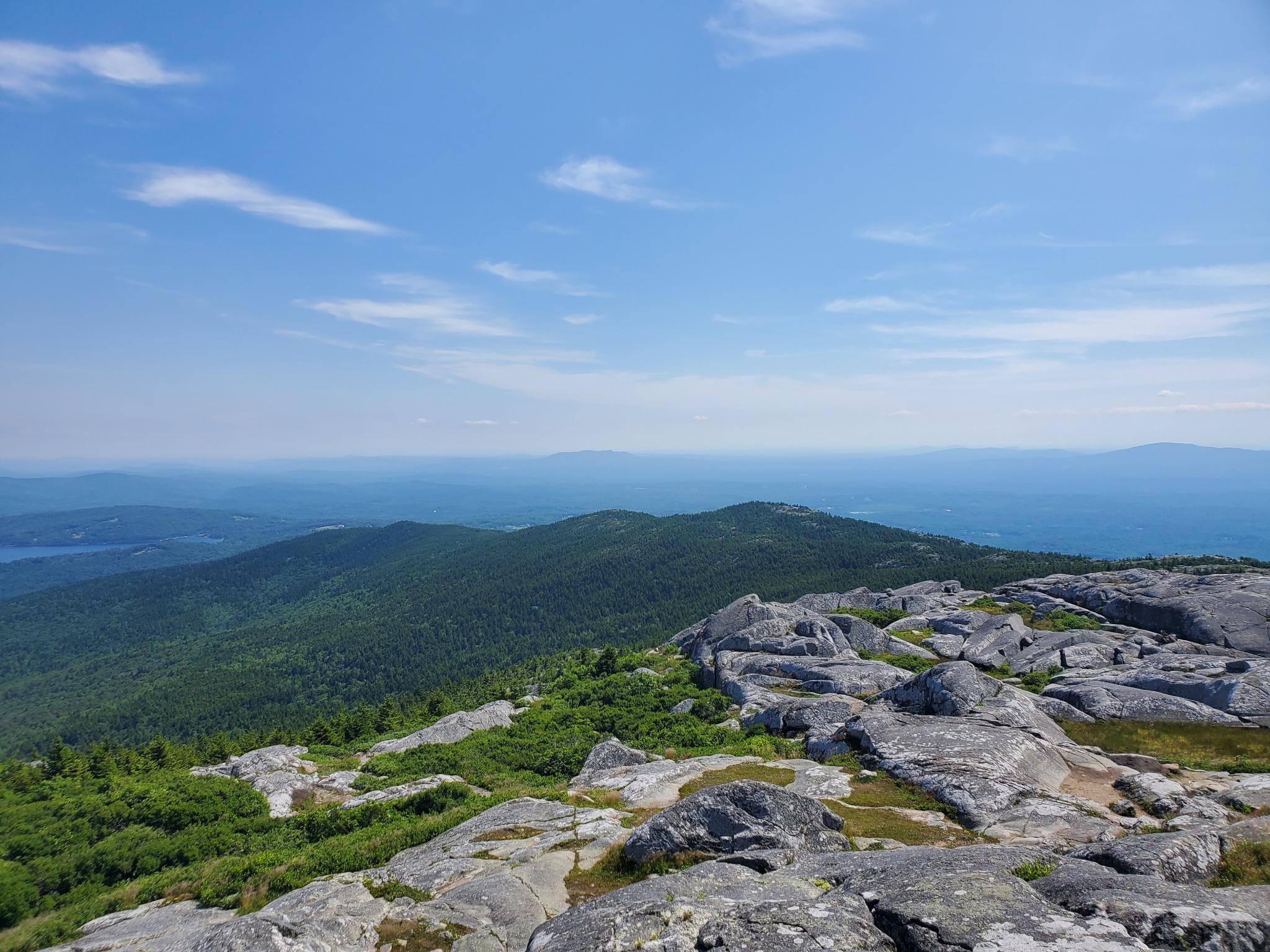
I left the city and go out into nature sometimes. A day hike up Mt. Monadnock, with a light backpack, was a blast. What happened on the internet this summer? Beats me.
My attention span expanded, and I started to slow down on the amount of books I was picking up and putting down. I was able to sit down and read much better by the end of the first month. When I picked up a book on Buddhism and was blown away at how much I was able to connect it to my life, I read it twice to take notes. I felt like I was in limbo after reading it, since I really connected with the philosophy.
That book not only hit me on such a deep level that I had to focus all my efforts to understand it and read it over, but it also marked the end of my computer-free time. Work started back up again, and I had less time to go into the library. I had to cook and eat and sleep before the next day. I had to get back on the computer to read emails and interact with the digital world again.
It was bittersweet.
Resilience
After 2 months, this lifestyle did start to become tiring. I found myself becoming bored and losing the motivation to get out every single day – it was no longer new and exciting, and starting to become a chore. As the summer started to wrap up, I wanted to physically move myself to the library less and less, but I also got bored sitting at home reading, so the temptation to go on the computer increased. Work started up again at just the right time to break apart this problem and inspire me to figure out how I was going to transition back to the internet and use it in a healthier way with my newfound perspective on it all.
There may never be a time in my life when I spend as much time at the library or reading physical books as I did this summer. As this time came to an end, I knew I had to make plans to focus my internet activity, now that it was back in my life. What would I actually do with the time when I did not have work to do – with a screen in front of me? Finding “simple, uncorrupted and focused” content on the internet will still remain a difficult task, and it is a continuous effort, but one that is ultimately necessary when I work with a computer in front of me. I started picking focused, nonpolitical websites to read online, like National Geographic, which matched my archeology, science, and exploration interests that I read about at the library.
With this summer experience, I can recognize now when I’m consuming too much brainrot content on the internet. I can turn 180 and read some long-form article and focus on it, or shut off the computer entirely. I’m sitting here now in October, with the summer weather fading away fast, recovering from being sick. I’ve been inside for two weeks, and quickly recognized that the internet took ahold of me again and pulled me in the wrong direction, and before I knew it I was down political rabbit holes that I never wanted to touch.
But I have the wherewithal to leave it. I know what that looks like now that I’ve experienced it fade away. I can do it again and again if need be. Spending an extended period of time away from it all has helped me not only build up a resistence to the internet trap, but an elasticity and resilience in fighting against it. Just like building resilience to hike mountains day after day.
I can be proud of myself for this (without becoming too prideful), since it’s so easy to consume internet content and requires a concrete effort to fight against doing so. It’s important to remember that my initial goal was to hike during this summer. Getting off the internet was just going to be an added bonus or effect of this. The ball started rolling in my head to reject a couch potato summer and strive for something bold and adventurous – when I started planning my hikes. The physical activity of getting out there was the catalyst to make the change to stay off the digital realm, regardless if I was in the mountains or not. I took the plunge and succeeded wildly, and I encourage my readers to also axe their computer desk for a summer and see what happens.
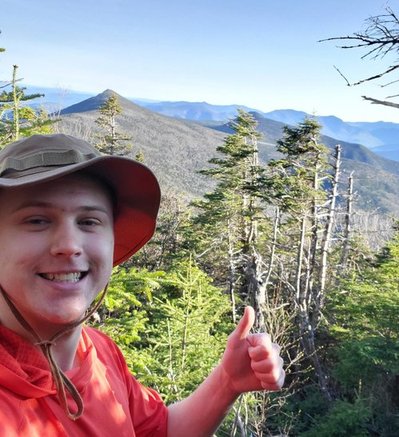
Maintaining positivity on a steep section between Mt. Liberty and Mt. Lafayette.
Cheers,
Daniel
P.S. I did turn on the computer a few times to update this site during the 2 months. It was a fun game to make sure I didn’t subliminally open up the browser and go on social media. :)